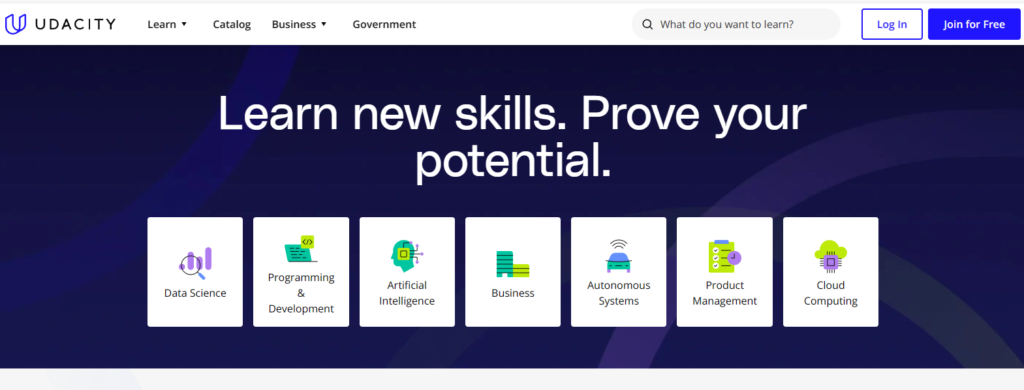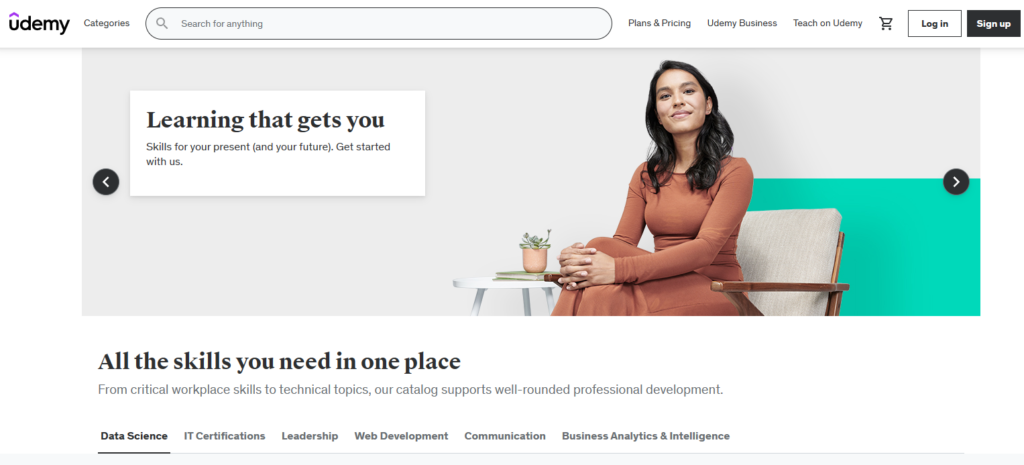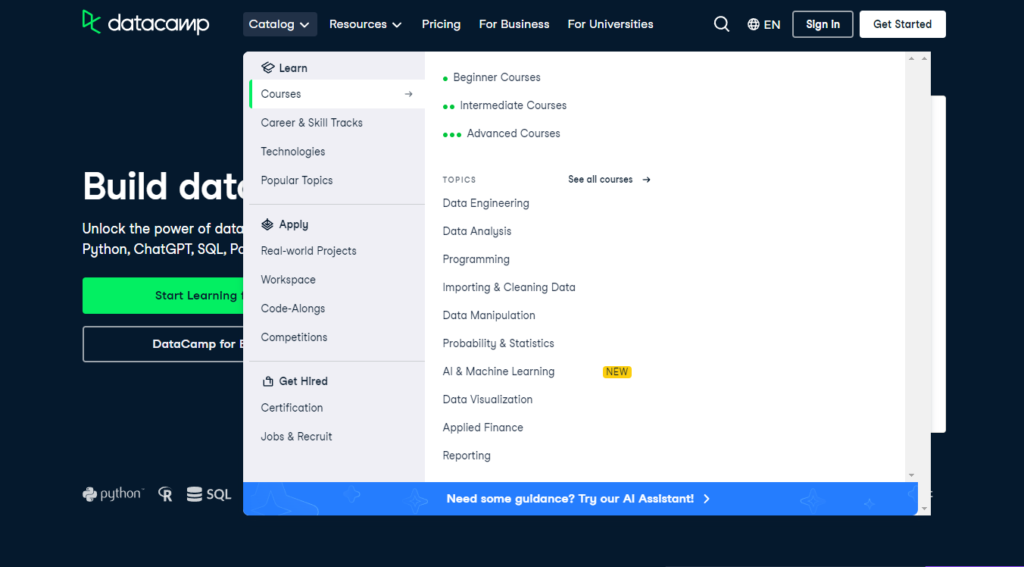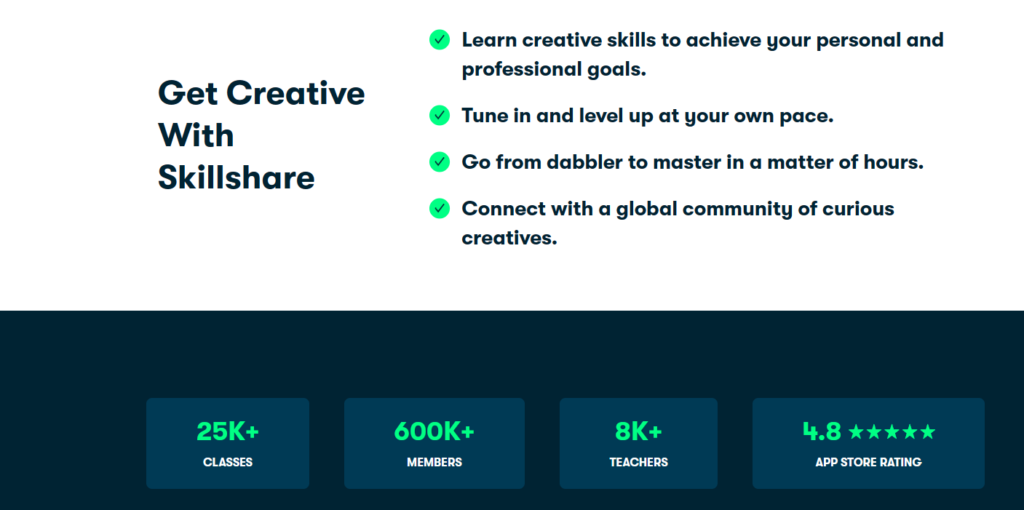Introduction: 5 Coursera Alternatives Comparision In 2024
Coursera stands as a beacon in online learning, partnering with leading universities to offer a diverse range of academic and professional courses. Despite its comprehensive offerings and the value of its accredited certificates, Coursera may not meet everyone’s needs, particularly those looking for more affordability, creative courses, or specialized tech training. Hence, we explore five alternatives: Udacity, Udemy, DataCamp, edX, and Skillshare. Each platform offers unique advantages—from Udacity’s focused tech programs and Udemy’s extensive course library to DataCamp’s data science specialization, edX’s academic rigor, and Skillshare’s creative community. This guide aims to match learners with platforms that best suit their educational preferences and career goals.
Advantages of Coursera:
- Extensive Course Catalog: With over 7,000 courses, Coursera boasts a vast selection across numerous fields, in partnership with over 300 top universities and organizations.
- Quality of Instruction: Courses are designed and taught by faculty from world-renowned institutions, ensuring a high-quality learning experience.
- Flexible Learning Options: Learners can choose from self-paced or scheduled courses to best suit their individual schedules.
- Accredited Certifications: Completing courses can earn learners certificates that are recognized by employers, enhancing their professional credentials.
- Financial Aid Availability: To make education more accessible, Coursera offers financial aid and scholarships for those who qualify.
Disadvantages of Coursera:
- Complex Pricing Structure: Prices for courses start at $49, with degrees ranging from $9,000 to $50,000, and MasterTrack programs from $2,000.
- Variable Course Quality: Despite the high number of courses, quality can vary.
- Limited Hands-On Learning: Some courses might not fully cater to hands-on learning needs.
- Subscription Confusion: The mix of one-off payments, subscriptions, and Coursera Plus at $59 monthly or $399 annually can be confusing.
- Competitive Financial Aid: Securing financial aid can be challenging, with it not covering all expenses.
| Platforms | Advantage | Disadvantage | Best For | Accredited | Price Range |
|---|---|---|---|---|---|
| Coursera | Academic rigor, partnerships with universities, accredited certificates | May be expensive, focuses more on academic subjects | Those seeking degrees or professional development | Yes | $59 USD monthly or $399 USD annually |
| Udacity | Industry-relevant nanodegrees, mentorship | Higher cost, focused subject areas | Tech professionals, career advancement | No (But recognized by industry) | Nanodegrees start around $249/month |
| Udemy | Vast course selection, affordability | Varied course quality, non-accredited | Hobbyists, skill development | No | Courses typically range from $19.99 to $199.99, with sales |
| DataCamp | Specialized in data science, hands-on learning | Niche focus, subscription model | Aspiring data scientists and analysts | No | Subscription starts at $25/month billed annually |
| edX | University-level courses, accredited programs | Higher cost for certificates/degrees, time commitment | Academic advancement, formal education | Yes | Free to enroll, with fees for certificates; Degrees can cost up to several thousand dollars |
| Skillshare | Creative and community-driven learning, project-based | Non-accredited, subscription model | Creatives, learning new skills/hobbies | No | Monthly subscription starts around $19, with annual plans offering a discount |

Udacity: Specializing in Tech and Career Advancement
In the diverse landscape of online learning, Udacity stands out as a beacon for those intent on forging a path in technology and career advancement. Unlike the generalist approach of Coursera, which offers a wide range of subjects, Udacity hones in on the tech and business sectors with laser focus. This platform has carved a niche for itself by offering Nanodegree programs, developed in partnership with tech behemoths like Google, AWS, Mercedes, and Nvidia. These programs are tailored to impart deep, practical knowledge and skills that are highly sought after in the current job market.
Udacity versus Coursera: A Path Less Trodden
While Coursera prides itself on a broad educational spectrum, encompassing everything from humanities to hard sciences, Udacity offers a stark contrast. It zeroes in on technology and business, catering to those who are not just looking to learn, but to pivot their careers or escalate their standing in the tech world. This specialization is buoyed by Udacity’s collaborations with leading industry figures, ensuring the curriculum is not just up-to-date but ahead of the curve.
Who Should Opt for Udacity?
Udacity shines as the go-to platform for individuals poised to dive deep into the tech industry. Whether you’re starting from ground zero or aiming to bolster your existing tech prowess, Udacity’s hands-on approach, centered around real-world projects and personalized mentorship, sets it apart. It’s the ideal hunting ground for learners eyeing a transition into tech roles or looking to upskill within their current tech careers.
The Udacity Advantage
- Industry-Relevant Curriculum: The synergy between Udacity and its industry partners means learners get access to skills that are currently in demand, making them job-ready upon course completion.
- Personalized Mentorship: Each Nanodegree student benefits from one-on-one guidance from industry experts, elevating the learning journey.
- Career Services: Beyond the courses, Udacity offers career coaching and CV advice, acting as a conduit to the job market.
- High-Quality Content: Known for its premium, proprietary content and an intuitive learning experience, Udacity sets a high bar for online education quality.
Points to Consider
- Focused Subject Areas: Specialization means Udacity’s offerings are concentrated in technology and business, with fewer options outside these realms.
- English Language Material: The primary language of instruction is English, which might restrict access for non-English speakers.
- Investment Required: While there are over 200 free courses, the Nanodegrees—Udacity’s flagship offerings—require a financial commitment, positioning it as a premium option in comparison to some alternatives. It could cost over total investment to as much as $2,400 for each Nanodegree course which ranged from 6 to 12 month.
Why Choose Udacity Over Coursera?
Choosing Udacity over Coursera means betting on depth over breadth. Udacity’s partnership with leaders in the tech industry not only lends gravitas to its Nanodegrees but also aligns its offerings with what employers are actively seeking. Furthermore, Udacity’s emphasis on career development, including resume crafting and job search strategies, offers concrete benefits for those aiming for significant professional advancement. For learners seeking a focused and industry-aligned educational experience with the potential for career transformation, Udacity emerges as the superior choice.

Udemy: The Versatile and Accessible Learning Platform
Udemy stands as a colossus in the realm of online learning, offering an unparalleled range of courses that cater to virtually every conceivable interest and profession. Unlike Coursera, which leans towards academic and professional development courses, Udemy prides itself on its vast and diverse catalog. With over 210,000 courses and 62 million students (as claimed by Udemy), this platform serves as a global marketplace for learning and teaching online.
Udemy versus Coursera: A Diverse Spectrum of Learning
Coursera is known for its partnerships with universities and colleges, offering courses that often align with traditional academic subjects and professional certification paths. Udemy, on the other hand, democratizes the learning experience by providing a platform where anyone can develop a course on almost any subject. This open approach has led to a rich tapestry of content ranging from programming and data science to personal development and hobbyist courses.
Ideal Candidates for Udemy
Udemy’s broad appeal makes it an ideal platform for a wide range of learners. Whether you’re looking to pick up a new hobby, advance your career with new skills, or even delve into completely new professional territories, Udemy likely has something for you. Its flexibility and variety cater to lifelong learners, hobbyists, and professionals alike, offering bite-sized lessons to comprehensive course paths.
The Udemy Advantage
- Extensive Course Selection: With courses on nearly any topic imaginable, learners have the freedom to explore a multitude of subjects.
- Affordable Learning: Udemy frequently offers discounts, with many courses available for as little as $9.99 during sale periods. This makes learning new skills or hobbies accessible to a wider audience.
- Lifetime Access: Once enrolled, Udemy students gain lifetime access to their courses, allowing them to learn at their own pace and revisit material anytime.
- Quality and Variety: Courses range from beginner to advanced levels, taught by industry professionals and subject matter experts.
Points to Consider
- Varied Course Quality: Given the open nature of the platform, course quality can vary widely, depending on the instructor’s expertise and teaching method.
- Non-Accredited: Courses on Udemy are not accredited by educational institutions, which may be a consideration for those seeking formal qualifications.
- Marketplace Model: The vast selection of over 210,000 courses means that students sometimes face challenges in sifting through to find the ones that best meet their needs and quality expectations. With such a large number of courses, it can be difficult to ensure the choice aligns perfectly with a learner’s objectives and desired level of expertise.
Why Choose Udemy Over Coursera?
Opting for Udemy over Coursera is a choice for variety, affordability, and flexibility. Udemy’s model allows for an expansive and ever-growing library of courses, making it possible to find content that might not be available on more academically focused platforms like Coursera. Moreover, the platform’s frequent sales and lifetime access to purchased courses make it a highly attractive option for budget-conscious learners and those who prefer to learn at their own pace. For individuals seeking to broaden their knowledge base or acquire new skills without a significant financial or time commitment, Udemy stands out as a compelling alternative. The challenge of navigating the vast catalog is a small trade-off for access to a world of learning opportunities.

DataCamp: Specializing in Data Science and Analytics Learning
DataCamp emerges as a specialized platform in the crowded field of online education, with a laser-sharp focus on data science and analytics. Unlike Coursera’s broader academic and professional development offerings, DataCamp provides a curated learning path for those specifically interested in diving deep into the world of data. It offers over 350 courses and projects, meticulously designed to guide learners from beginner to expert levels in data science, analytics, and related programming languages.
DataCamp versus Coursera: A Focused Journey in Data Mastery
Coursera offers a wide-ranging curriculum in partnership with universities and organizations, covering various fields from humanities to tech. DataCamp, contrasts this by offering a niche learning experience centered exclusively on data skills. This focus ensures that learners gain practical, hands-on experience with real datasets, making it a preferred choice for individuals looking to specialize in data science or analytics roles.
Ideal Candidates for DataCamp
DataCamp is tailor-made for individuals aspiring to master data science, analytics, or programming languages such as Python, R, and SQL. Whether you’re a complete novice in data analysis or a professional looking to enhance your data manipulation and visualization skills, DataCamp provides a structured and interactive learning environment. Its courses are especially beneficial for students, professionals, and anyone with a keen interest in harnessing the power of data.
The DataCamp Advantage
- Structured Learning Paths: DataCamp offers guided paths to help learners progress from fundamental concepts to advanced techniques in data science and analytics.
- Hands-on Experience: Interactive exercises and real-life project work provide practical experience with data.
- Industry-Relevant Skills: The curriculum is designed to teach skills that are in high demand in the job market, preparing learners for career advancements in the data field.
- Accessible Learning: With a subscription model, DataCamp allows unlimited access to all courses and projects, making it easy for learners to explore different areas of interest at their own pace.
Points to Consider
- Niche Focus: DataCamp’s exclusive focus on data science and analytics means it might not cater to learners seeking education in non-data related fields.
- Subscription Model: Access to DataCamp’s full library requires a subscription, which might be a consideration for those on a tight budget. However, it also offers some free introductory courses for beginners.
- Learning Style: The platform’s heavy reliance on interactive exercises is excellent for hands-on learning but may not suit everyone’s preferences, especially those who favor more traditional, lecture-based content.
Why Choose DataCamp Over Coursera?
Opting for DataCamp over Coursera is a strategic decision for those committed to entering or advancing within the data science and analytics fields. DataCamp’s specialized curriculum ensures that every course, exercise, and project is relevant to your data learning journey, providing a more focused and cohesive learning experience compared to Coursera’s broad offerings. Furthermore, DataCamp’s interactive platform and project-based learning approach equip learners with practical skills and real-world experience, bridging the gap between academic concepts and their application in professional settings. For aspiring data scientists, analysts, or anyone passionate about data, DataCamp offers a comprehensive and immersive path to mastery.

edX: Bridging the Gap Between Academia and Online Learning
edX stands as a distinguished platform in the online education sphere, forged through a collaboration between Harvard University and MIT. It uniquely bridges the academic rigor of top-tier universities with the accessibility of online learning, offering over 3,000 courses from institutions around the globe. Unlike Coursera, which also partners with universities but offers a wide array of courses including professional certificates, edX focuses deeply on academic courses that often lead to college credit or professional certificates.
edX versus Coursera: Academic Excellence Meets Online Flexibility
While both platforms boast partnerships with renowned universities, edX is particularly celebrated for its foundation in academic excellence, emanating from its prestigious origins. It offers learners access to a broad spectrum of subjects from computer science to humanities, all designed and delivered by leading educators and institutions. edX’s commitment to quality education is evident in its MicroMasters, Professional Certificates, and Online Master’s Degrees, catering to learners seeking deep, academic exploration or career advancement.
Ideal Candidates for edX
edX is the platform of choice for individuals aiming for academic advancement or professional growth through high-quality courses. It caters to students, professionals, and lifelong learners who value education from respected universities and colleges. Whether you’re looking to complete a degree, earn a certificate, or simply gain new knowledge in a field of interest, edX provides a structured and credible path.
The edX Advantage
- University-Level Courses: Access to courses developed by some of the world’s leading universities and institutions.
- Accredited Certifications and Degrees: Offers a range of accredited options from professional certificates to online master’s degrees, providing tangible credentials for career advancement.
- Flexible Learning Options: With self-paced courses and scheduled programs, learners can find options that fit their timetable.
- Financial Aid and Scholarships: edX offers financial assistance to learners who qualify, making education more accessible.
Points to Consider
- Course Commitment: The academic nature of edX courses often requires a significant time commitment, which might be challenging for those with busy schedules.
- Cost: While many courses offer free access to materials, obtaining a verified certificate, professional certificate, or degree requires an investment. The price for the verified course track usually starts at around $50 and can go all the way up to $300, which can vary widely depending on the course or program. This is an important consideration for those assessing the value and affordability of their education.
- Navigating the Catalog: With a vast array of offerings, finding the right course or program might require some research and decision-making on the part of the learner.
Why Choose edX Over Coursera?
Choosing edX over Coursera is a nod to the pursuit of academic distinction and the desire to connect with the pedagogical foundations of world-renowned institutions like Harvard and MIT. For learners who prioritize academic credentials, degree programs, or specialized professional development within an academically rigorous framework, edX offers a compelling platform. Its university partnerships not only ensure a high caliber of instruction but also afford learners the opportunity to earn recognized credentials that can significantly impact their professional trajectories. For those seeking an education that bridges the traditional university experience with the flexibility of online learning, edX is an exemplary choice.

Skillshare: Unleashing Creativity and Lifelong Learning
Skillshare distinguishes itself in the online learning ecosystem by emphasizing creativity, design, entrepreneurship, lifestyle, and more. Unlike Coursera, which is known for its academic and professional development courses, Skillshare caters to a broad audience seeking to explore their creative potential or enhance their skills in informal and engaging ways. With thousands of courses available, Skillshare facilitates an environment where anyone can learn new skills, pursue hobbies, or develop professionally in creative fields.
Skillshare versus Coursera: Fostering Creativity and Practical Skills
Coursera partners with universities and institutions to offer courses that often lead to certifications or degrees, focusing on academic rigor and professional advancement. In contrast, Skillshare focuses on providing practical, skill-based learning experiences. Courses on Skillshare are designed to be accessible and engaging, making it easy for learners to start applying their new skills to real-world projects right away. This platform is ideal for individuals looking to enhance their creativity, learn at their own pace, and join a community of like-minded learners.
Ideal Candidates for Skillshare
Skillshare is perfect for creatives, entrepreneurs, and anyone looking to learn practical skills in areas like graphic design, photography, creative writing, business, technology, and more. Whether you’re starting a new hobby, looking to switch careers, or simply wanting to learn something new, Skillshare’s informal learning environment and community-driven courses offer a welcoming space for exploration and growth.
The Skillshare Advantage
- Creative and Diverse Course Offerings: From arts and crafts to digital marketing, Skillshare offers courses that cater to a wide array of interests.
- Community Interaction: Learners can interact with each other and instructors, fostering a sense of community and collaboration.
- Project-Based Learning: Many courses include hands-on projects, allowing learners to apply what they’ve learned in a practical context.
- Flexible Learning Schedule: Skillshare’s self-paced courses enable learners to study according to their own schedules.
Points to Consider
- Non-Accredited: Skillshare courses are non-accredited, making them more suitable for learners seeking skill development rather than formal qualifications.
- Subscription Model: Access to Skillshare’s full course library requires a subscription, which may be a consideration for those looking for free learning resources. However, Skillshare does offer a free trial for new users.
- Varied Course Quality: Due to the platform’s open nature, course quality can vary. Learners may need to explore reviews or ratings to find the best courses.
Why Choose Skillshare Over Coursera?
Opting for Skillshare over Coursera is a choice for those prioritizing creative exploration and practical skill acquisition over traditional academic learning. Skillshare’s strength lies in its diverse course offerings and community-driven approach, making it an ideal platform for learners seeking to enhance their creative skills in a flexible and supportive environment. The emphasis on project-based learning ensures that learners can immediately apply their new skills, making Skillshare an attractive option for those looking to quickly develop practical abilities in creative fields. For individuals eager to explore their creativity and connect with a community of like-minded learners, Skillshare offers a vibrant and engaging learning experience.





Pingback: 5 Python Program To Start Your Data Analyst Career - Review Links
Pingback: Are Coursera certifications still worth it in 2024? - Review Links
Pingback: Unlocking STEM Brilliance: A Comprehensive Review of Brilliant
Pingback: Comprehensive Edx Review In 2024: Exploring Courses, Quality, Usability, and More
Pingback: In-Depth Review of Codecademy: An Online Learning Platform In 2024